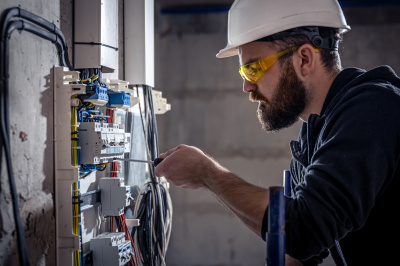What Testing Is Done In An EICR?
A building's wiring, fixtures, and fittings are evaluated in an electrical installation condition report (EICR). An EICR will assess each electrical system on the property to look for any possible safety issues. To make sure that every part of the electrical system is operating effectively and safely, a skilled electrician will perform a number of tests. The wiring, circuits, fuses, switches, outlets, and other permanent electrical components must all be tested.
The electrical system will be visually inspected by the electrician to look for any indications of wiring wear or damage, such as frayed or exposed wires. Additionally, they will inspect each socket or switch to make sure the wiring is safe and that it is properly earthed. The electrical current flowing through the circuits will then be measured by the electrician using sophisticated testing equipment. This will reveal any shorts, overloads, or bad connections in the wiring. Finally, they will test the system's insulation resistance and earthing to see if it complies with the necessary safety regulations.
Sockets Not Working?
A defective socket may be the cause of a single non-working socket. The power to the socket must be turned off first. Are there any obvious traces of deterioration or fading on the socket? If this is the case, a new socket has to be installed. If not, the socket must be taken out of the wall so that the wiring may be examined. Loose wire connections or an inner conductor that needs reconnecting are the most frequent plug socket flaws. A qualified electrician should examine both of these issues.
The Residual Current Device (RCD), or "tripping", or cutting out, is the primary source of issues with multiple plug sockets not working. Designed to shut off if an electrical circuit draws too much power and becomes harmful, an RCD is a safety switch. The RCD itself may be the source of the issue; for instance, it may have a current rating that is inadequate for the quantity of power that it is required to manage. Additionally prone to tripping when they shouldn't, low-quality RCDs. RCDs are exceedingly stable, nevertheless, and are hence seldom defective. If the RCD itself is not the issue, it could be brought on by any number of different things.

Need assistance finding electrical inspections near you?
Get a QuoteFaulty Sockets And Loose Wiring
When the electrical wiring of the terminals is improper, your power sockets become overheated. Power sockets with loose wiring experience abnormally high heat build-up, which can result in serious electrical risks. Low maintenance is a big factor in loose wiring in plug sockets, which also trips off your circuit breakers when the electrical wires in a power socket become too hot. Without regular maintenance, plug sockets become less secure and exposed contact points cause resistance and heat build-up on the cables and wires that link them.
Electrical issues in a house can be caused by both loose wiring and damaged sockets. If this keeps happening, you should call an electrician to check on the wiring. This is because there may be a trip in the circuit breaker. It's possible that the wiring has to be completely replaced or that it only needs to be tightened up after becoming loose over time. An experienced electrician will be able to recognise the issue and resolve it quickly.
Cracks And Socket Corrosion
The electrical outlets' plastic insulation can occasionally shatter, allowing dirt and other dust to gather inside the socket. An electric arc forms when a piece of electrical equipment is plugged into a power outlet that has dirt or debris in it; due to the possibility of electric shock and severe fire incidents, this is a very risky position. Over time, the build-up of dust and dirt causes the electrical outlets to corrode. For safety reasons, always avoid plugging anything into a corroded plug socket until it has been removed and replaced.
If you hear buzzing, popping, or crackling noises coming from your power outlet, you need to take action right away. It's usually recommended to seek an electrician to replace your power socket; this is because it means your sockets are corroded. If the power sockets are corroded, you will start to smell something burning - this is because the dirt has infiltrated the wires and is causing a reaction. Debris and other particles build up, which leads to overheating and the protective layer over the wires burning off. To prevent electrical fires, it is best to turn off the power supply as soon as there is a spark or a burning smell.
Sockets And Improper Grounding Outlets
You need to determine whether your electrical outlets have two or three prongs while evaluating them. Ungrounded power outlets are those that have two prongs or holes. On the other hand, plug sockets with three prongs are grounded and provide your home with an acceptable level of electrical safety. The three-pronged power socket's biggest benefit is that it automatically cuts off the electricity when the voltage fluctuates. Purchasing three-pronged outlets ensures that your house is correctly grounded and safe from electrocution. Installing tamper-resistant power outlets is essential when it comes to keeping your kids from electrocuting themselves.
Children cannot put their hands or any other foreign things into the socket holes with these types of power sockets - unless you enjoy hospital trips. It's critical to have your sockets inspected as quickly as possible if they keep tripping. An EICR will reveal any possible security issues and enable you to take the required precautions to safeguard your house. You can feel secure in your house by doing routine inspections and utilising approved electrical installations.
In this article:
